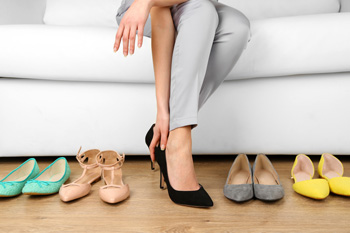 While high heels are considered to be fashionable to many, they are known to be bad for your feet. The higher the heel, the greater the pressure on the balls of your feet. High heels also tend to not provide enough room for the toes and the forefoot. This can lead to conditions like hammertoe, Morton’s neuroma, calluses and corns, and can exacerbate bunions. They can even cause health problems for the back and legs. If you still want to wear high heels, try to wear shorter ones and only wear them for a short period of time. If possible, bring another pair of shoes that are shorter in heel height and provide support for your feet. Flats and sandals generally do not provide support for your feet, so it is also recommended to wear those for as little as possible as well.
While high heels are considered to be fashionable to many, they are known to be bad for your feet. The higher the heel, the greater the pressure on the balls of your feet. High heels also tend to not provide enough room for the toes and the forefoot. This can lead to conditions like hammertoe, Morton’s neuroma, calluses and corns, and can exacerbate bunions. They can even cause health problems for the back and legs. If you still want to wear high heels, try to wear shorter ones and only wear them for a short period of time. If possible, bring another pair of shoes that are shorter in heel height and provide support for your feet. Flats and sandals generally do not provide support for your feet, so it is also recommended to wear those for as little as possible as well.
High heels have a history of causing foot and ankle problems. If you have any concerns about your feet or ankles, contact one of our podiatrists from Lovely Foot Associates, PC. Our doctors can provide the care you need to keep you pain-free and on your feet.
Effects of High Heels on the Feet
High heels are popular shoes among women because of their many styles and societal appeal. Despite this, high heels can still cause many health problems if worn too frequently.
Which Parts of My Body Will Be Affected by High Heels?
What Kinds of Foot Problems Can Develop from Wearing High Heels?
How Can I Still Wear High Heels and Maintain Foot Health?
If you want to wear high heeled shoes, make sure that you are not wearing them every day, as this will help prevent long term physical problems. Try wearing thicker heels as opposed to stilettos to distribute weight more evenly across the feet. Always make sure you are wearing the proper shoes for the right occasion, such as sneakers for exercising. If you walk to work, try carrying your heels with you and changing into them once you arrive at work. Adding inserts to your heels can help cushion your feet and absorb shock. Full foot inserts or metatarsal pads are available.
If you have any questions please feel free to contact our office located in Johnstown, PA . We offer the newest diagnostic and treatment technologies for all your foot and ankle needs.